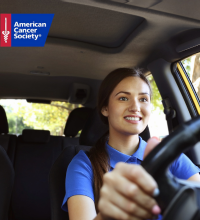University of Arizona Cancer Center – a Department of Banner Health Receives $7,000 from the American Cancer Society To Provide Transportation for People in Cancer Treatment
11/21/2023
To alleviate the financial burden of cancer treatment, the American Cancer Society recently awarded a $7,000 transportation grant to the University of Arizona Cancer Center – a Department of Banner (UACC). The grant is one of 461 transportation grants totaling $6.8 million awarded to health systems nationwide. The funding will allow health systems to provide eligible patients an estimated 781,000 rides to treatment.
“The American Cancer Society Transportation grant is a game changer for our patients at UACC,” says Grace Weiss MSN, RN, associate director of RN Physician Practice Operations at UACC. “The UACC is a National Cancer Institute-designated cancer center and a Commission on Cancer accredited comprehensive cancer center serving southern Arizona and surrounding states. Given the NCI distinction and the depth and breadth of the comprehensive services available, individuals from counties throughout Arizona as well as other areas of the United States and Mexico travel to UACC for their care. Most residents need to travel by personal car and do not have access to transportation support systems such as volunteer programs seen in other densely populated areas. In addition, many of these rural counties have the highest levels of poverty in the state.”
Why Transportation Funding is Needed
Lack of transportation to treatment prevents many people living with cancer from getting high-quality care which worsens cancer outcomes.
- In a study presented at the 2022 American Society of Clinical Oncology Quality Care Symposium, American Cancer Society researchers found that 2.8% of cancer survivors reported delays in care due to transportation barriers. Cancer survivors who delayed care due to lack of transportation were more likely to use the emergency room and had the highest risk of all-cause and cancer-specific mortality.
- According to the American Cancer Society’s Cancer Treatment and Survivorship Facts & Figures 2022-2024, cancer survivors experience greater financial hardship than the general population for many reasons including the inability to work. They also have higher out-of-pocket medical costs compared to people without a history of cancer. The economic burden of cancer is more profound in survivors who are younger or were diagnosed in childhood, underinsured or uninsured, and have lower incomes.
“Not having access to high-quality cancer treatment due to where you live contributes to the disparities we see in cancer outcomes. It’s important to provide the funding and programming needed to keep a lack of transportation from impacting survival,” said Dr. Arif Kamal, chief patient officer for the American Cancer Society. “The local health systems we partner with across the country use this funding to deliver assistance directly to the patients who need it most.”
The American Cancer Society believes all people should have a fair and just opportunity to live a longer, healthier life free from cancer regardless of how much money they make, skin color, sexual orientation, gender identity, disability status or where they live. In addition to providing transportation funding to health systems, the American Cancer Society runs a Road To Recovery program that provides free rides to and from treatment.
